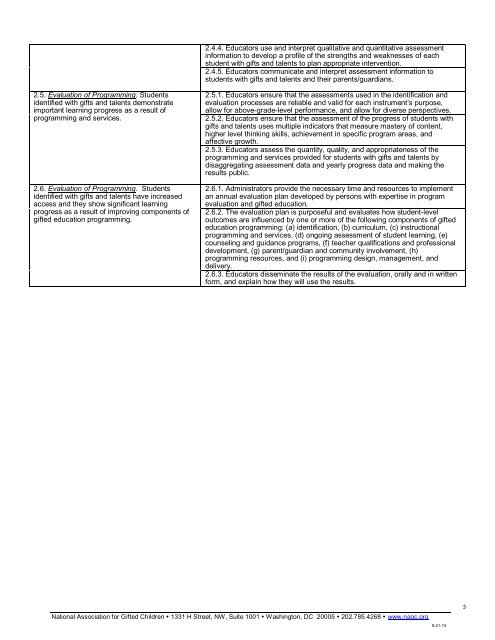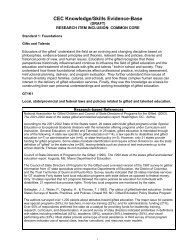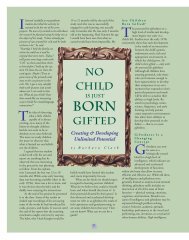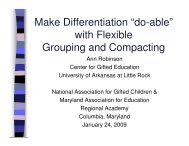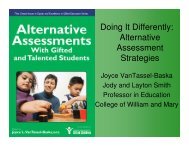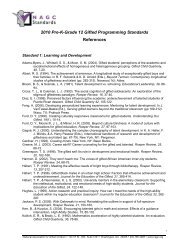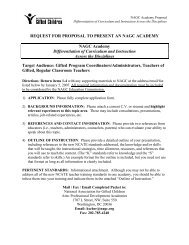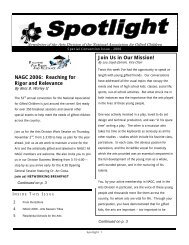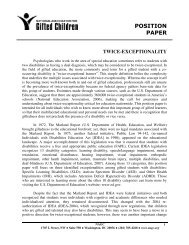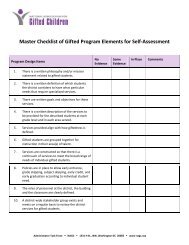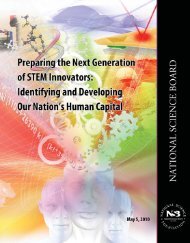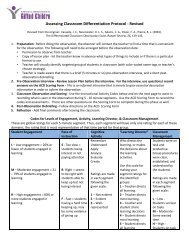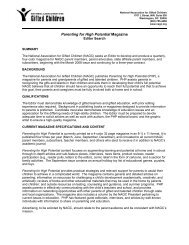2010 Pre-K-Grade 12 Gifted Programming Standards - NAGC
2010 Pre-K-Grade 12 Gifted Programming Standards - NAGC
2010 Pre-K-Grade 12 Gifted Programming Standards - NAGC
You also want an ePaper? Increase the reach of your titles
YUMPU automatically turns print PDFs into web optimized ePapers that Google loves.
2.4.4. Educators use and interpret qualitative and quantitative assessment<br />
information to develop a profile of the strengths and weaknesses of each<br />
student with gifts and talents to plan appropriate intervention.<br />
2.4.5. Educators communicate and interpret assessment information to<br />
students with gifts and talents and their parents/guardians.<br />
2.5. Evaluation of <strong>Programming</strong>. Students<br />
identified with gifts and talents demonstrate<br />
important learning progress as a result of<br />
programming and services.<br />
2.6. Evaluation of <strong>Programming</strong>. Students<br />
identified with gifts and talents have increased<br />
access and they show significant learning<br />
progress as a result of improving components of<br />
gifted education programming.<br />
2.5.1. Educators ensure that the assessments used in the identification and<br />
evaluation processes are reliable and valid for each instrument’s purpose,<br />
allow for above-grade-level performance, and allow for diverse perspectives.<br />
2.5.2. Educators ensure that the assessment of the progress of students with<br />
gifts and talents uses multiple indicators that measure mastery of content,<br />
higher level thinking skills, achievement in specific program areas, and<br />
affective growth.<br />
2.5.3. Educators assess the quantity, quality, and appropriateness of the<br />
programming and services provided for students with gifts and talents by<br />
disaggregating assessment data and yearly progress data and making the<br />
results public.<br />
2.6.1. Administrators provide the necessary time and resources to implement<br />
an annual evaluation plan developed by persons with expertise in program<br />
evaluation and gifted education.<br />
2.6.2. The evaluation plan is purposeful and evaluates how student-level<br />
outcomes are influenced by one or more of the following components of gifted<br />
education programming: (a) identification, (b) curriculum, (c) instructional<br />
programming and services, (d) ongoing assessment of student learning, (e)<br />
counseling and guidance programs, (f) teacher qualifications and professional<br />
development, (g) parent/guardian and community involvement, (h)<br />
programming resources, and (i) programming design, management, and<br />
delivery.<br />
2.6.3. Educators disseminate the results of the evaluation, orally and in written<br />
form, and explain how they will use the results.<br />
National Association for <strong>Gifted</strong> Children • 1331 H Street, NW, Suite 1001 • Washington, DC 20005 • 202.785.4268 • www.nagc.org<br />
9-21-10<br />
3


